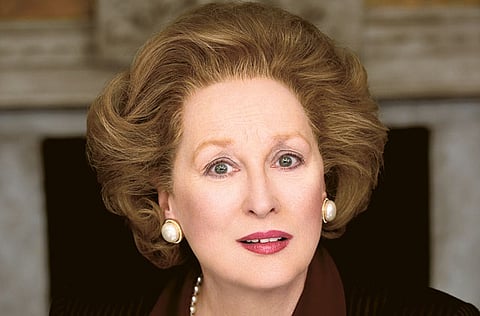Decoding the Iron Lady
Award-winning actress Streep brilliantly portrays how Thatcher's fiery charisma stemmed from her contempt for complacent men

The Iron Lady is the most important political film for years. Nothing and no one has done more, in the 22 years since she was kicked out of office, to rehabilitate former British prime minister Margaret Thatcher.
As anyone who has been on the BBC's Question Time will know, you only have to mention her name and you will come under a fusillade of boos. Not any more, I suspect; or not so much — not after this film. It is not that it is an accurate historical portrait.
I bet she never barked "Sink it!" when her generals asked what they should do with the Belgrano. I know that she wasn't in the Commons car park when Airey Neave was blown up, and I am sure that she didn't run up the ramp to behold his mangled remains. She surely never ranted at her cabinet in quite those terms or subjected Geoffrey Howe to such insane humiliation.
She almost certainly never wore a hat in the Chamber or tried to push her way into a men's urinal, but if the film takes liberties, it is poetically truthful. It is true to the essence of Thatcher, and above all Meryl Streep is amazing. She enters into her; she becomes her: the ruby lips, the flashing eyes, the pineapple hair, the pale skin transpiring at every pore with the fire of pure certainty.
Somehow this God-gifted, 62-year-old American actress has re-explained to the world what it was like to see, meet and be the West's first woman prime minister. Somewhere the film's director has said that it is a King Lear story, an examination of a tragic loss of power, a meditation on the sorrow of old age.
That may have been the intention of the writer and director (neither of whom, I guess, would call themselves ardent Thatcherites) — and yet it is the younger, stronger Thatcher/Streep who seizes the film and takes it over.
Thatcher herself emerges from this film as a far more revolutionary and inspiring figure — because she was a woman. At all the critical moments you can see that what really actuated Thatcher was a feminine impatience with the cosy, clubby, complacent politics of the post-war consensus — a consensus that was held overwhelmingly between men of a certain age and class.
Boardroom greed
Of course she believed in thrift and hard work and rewards for merit — but a proper understanding of what Thatcher really stood for is vital today. To take the issue of the hour, I believe she would have strongly disapproved of boardroom greed. She never really much liked the City — she thought that on the whole the bankers liked interest rates to be too high for the good of her vision of a property-owning democracy.
Insider traders were prosecuted on her watch, after years in which such tip-offs had been treated as a "victimless crime" that was traditionally conducted over a vinous, nose-tapping lunch. She got rid of automatic commissions for stockbrokers. She believed in competition, and allowing the market to work — not stitch-ups.
Ask yourself what Thatcher would have thought of a system where directors sit on each other's ‘remcoms' — remuneration committees — and defend each other's expanding awards, even when the directors in question have presided over commercial disaster of one kind or another. She would have thought it was absurd.
Thatcher wasn't against money, and she wasn't against pay as an incentive to real exertion and real talent. But she would have been totally opposed to all that now whiffs of a male-dominated cartel, a you-scratch-my-back-and-I'll-scratch-yours conspiracy against the shareholders and the wider interests of the company.
She would have been against any kind of crony capitalism, and as for the solution — well, she would not have wanted pay set by politicians, and she would not have gone for any kind of continental-style socialism. But I reckon she would certainly have gone for any kind of poujadiste revolt that gave shareholders a simple way of voting down pay awards they thought were excessive.
In tackling boardroom greed, British Prime Minister David Cameron is not bucking the market. He is acting in the true Thatcherite tradition because male clubbiness, jobbery, idleness and complacency were the very things Thatcher fought against.
— The Telegraph Group Ltd, London 2012
Boris Johnson is the mayor of London.


